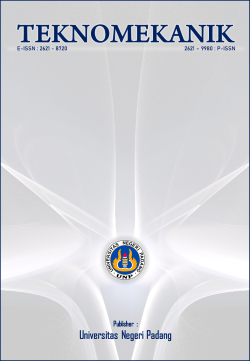Development of workshop work learning module and technical drawing by using the EPUB
DOI:
https://doi.org/10.24036/jptk.v4i2.16223Keywords:
Learning module development, EPUB, Quality education, Teaching materialAbstract
This study aims to develop a learning module for Workshop Work and Technical Drawing using EPUB for class X TAV students at SMKN 1 Sutera. This research is a series of processes or activities carried out to produce Workshop Work and Engineering Drawing learning modules using EPUB based on development theory. The purpose of developing a workshop work learning module and technical drawings using the EPUB is to produce a valid and practical learning module. The learning module developed is based on the ADDIE development model, which consists of the analysis, design, and development stages. development), implementation (implementation), and evaluation (evaluation). The first stage, analysis, is to analyze before product development is carried out. The second stage, Design, the design stage begins by determining the main concepts contained in the workshop work and engineering drawing subjects. Then the third stage of Development, carrying out product development through designing the components of the learning module, in this development process carried out is conducting validation tests, and practicality regarding products by experts. Furthermore, the fourth stage is Implementation, the implementation stage can be interpreted as a realization step of the design and development stage. The last stage is the Evaluation stage, which is taking action on the treatment of the learning module with EPUB that has been tested. Based on the validation of the learning module that has been carried out on the media expert validator, the value is 0.94 with a valid interpretation. "Furthermore, for material expert validation, the value is 0.89 with a valid interpretation. So it can be concluded that the developed learning module is feasible to use to improve the learning outcomes of the Workshop Work and Technical Drawing Class X TAV Students at SMK Negeri 1 Sutera. After the learning module is declared valid, then it is followed by practicality testing of teacher respondents who obtained the value practicality of 92.49% with very practical interpretation. While the practicality value based on student respondents was 82.39 with practical interpretation. However, overall practicality is very practical.
Downloads
References
Ago, G., Suharno, Mintarti, S., & Hariyadi, S. (2015). Effect Of Product Quality Perception , Trust , And Brand Image On Generic Drug Buying Decision And Consumer Satisfaction Of Hospital Patientsi In East Kalimantan. European Journal of Business and Management, 7(14), 50–69.
Asyhar, R. (2011). Kreatif mengembangkan media pembelajaran. Gaung Persada Press.
Audia, M. (2019). Pengembangan Media E–Book Dengan Bantuan Sigil Software Untuk Kelas Vii Mts Al-Hikmah Kedaton Bandar Lampung Pada Mata Pelajaran Fiqh.
Azwar, S. (2012). Realibilitas dan Validitas. Pustaka Pelajar.
Branch, R. M. (2009). Instructional Design: The ADDIE Approach.
Depdiknas. (2008). Pengembangan SMK Berstandar Nasional/Internasional. Departemen Pendidikan Nasional. Direktorat Pembinaan Sekolah Menengah Kejuruan.
Diana, W. (2020). Pengembangan Multimedia Interaktif Pada Mata Pelajaran Dasar Desain Grafis Kelas X di SMK Negeri 1 Painan. UNP.
Dwiki, N. (2016). Pengembangan Modul Pembelajaran Teknik Kerja Bengkel Berbasis Project Untuk Program Keahlian Teknik Elektronika Industry Kelas X SMK. Jurnal Vokasi, 5(2).
Hasbiyati, H., & Khusnah, L. (2016). Pengembangan E-Book Berekstensi Epub Pada Pembelajaran IPA SMP. Bioshell, 5(01), 298–305.
Majid, A. (2006). Perencanaan Pembelajaran. PT Remaja Rosdakarya.
Maran, Z. D. (2007). Peralatan Bengkel Otomotif. Andi.
Nasution. (2009). Modul Pembelajaran. Rineka Cipta.
Prasetyo, A. (2015). Pengembangan Job Sheet Teknik Kerja Bengkel Elektronika Sebagai Media Pembelajaran Praktik Siswa Kelas X di SMK Negeri 2 Wonosari. Jurnal Pendidikan, 2(1).
Pratama, S. O., & Yuhendri, M. (2020). Pengembangan Modul Kerja Bengkel dan Gambar Teknik untuk Sekolah Menengah Kejuruan. Jurnal Pendidikan Teknik Elektro, 01(01), 62–66.
Riduwan. (2007). Pengantar Statistika untuk Penelitian. Alfabeta.
Rivai, A. (2011). Hakikat Pendidikan. Rineka Cipta.
Sudjana, N. (2005). Penilaian Hasil Proses Belajar Mengajar. Rineka Cipta.
Sugiyono. (2012). Metode Penelitian Kuantitatif, Kualitatif dan R&D. Rineka Cipta.
Susanto. (2011). EPUB. Alfabeta.
Downloads
Published
Issue
Section
License
Copyright (c) 2021 finico finico, Hasan Maksum

This work is licensed under a Creative Commons Attribution 4.0 International License.





